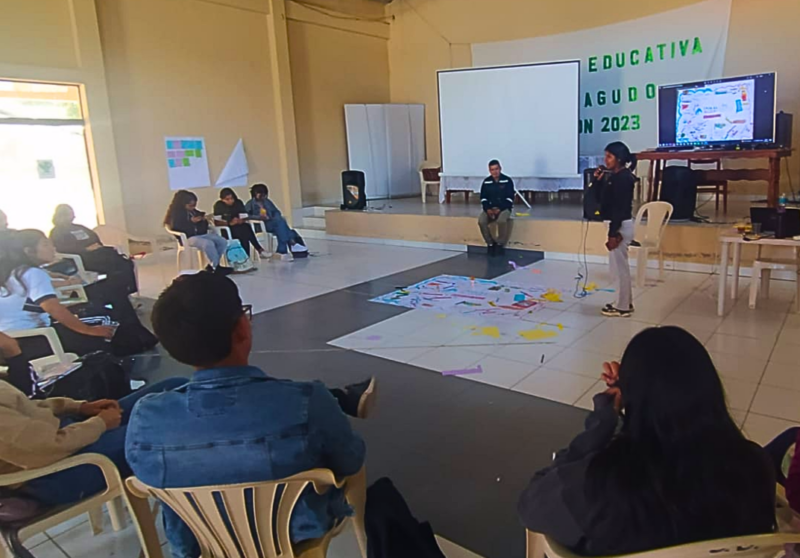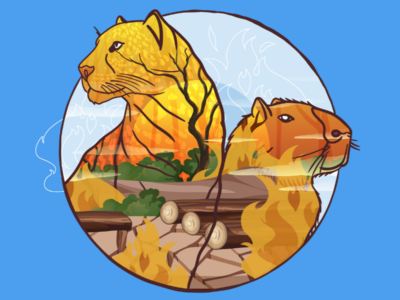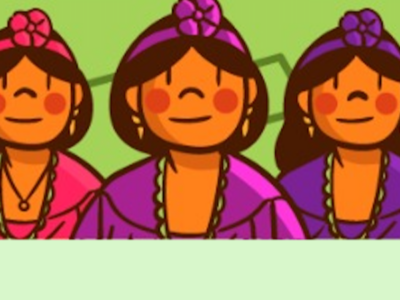
Photo of the workshop in Monteagudo, Bolivia taken by the author during the workshop
In the small town of Monteagudo, located in southeastern Bolivia, a group of high school students stood out for their commitment to promoting environmental issues and climate change. Their goal: to ask local media to pay more attention to young people's perspectives on these issues.
For these young people, the presence of young voices in the media, either as sources of information or as references, is still insufficient, and the messages directed at youth are poorly adapted.
Therefore, the young radio broadcasters from the Lucio Siles School participated in the media literacy course “Roipea Taperaɨ” (“Opening Paths” in the Guaraní language), a Rising Voices project with the support of the Avina Foundation within the framework of the Voices for Just Climate Action (VAC) project. The workshop was held in August 2023 in their city, located in the Chaco region.
The Gran Chaco is the second largest forest in South America, after the Amazon. This ecosystem is affected by drought, exploitation of natural resources, indiscriminate felling of trees and inequality, leading to adverse consequences for both the environment and the economy. This not only affects the region, but also the world.
The course focused on more discernment about mediatic narratives about climate change and the creation of narratives that more accurately reflect the realities experienced by local communities. One of the students who participated stated:
Aunque dicen que somos el futuro del país, no nos toman en cuenta, sino a los famosos, adultos que tienen cargos importantes. Cualquier decisión que se tome ahora nos va afectar a nosotros en un futuro.
Although they say that we are the future of the country, they do not take us into account, but rather the famous people, adults who have important positions. Any decision made now will affect us in the future.
Young voices in media can help them make an impact on public policies that contribute to local and regional environmental preservation.
Themes and formats adapted for young audiences
During the two-day course, they learned tools to analyze the information that media in the Chaco region and Bolivia produce about the environment and climate change. Subsequently, the students proposed communication narratives about what they would like the media to consider. These proposals were summarized in the following words:
Precaución, arte, sequías, acuerdos, contaminación, ríos, destrucción, cultura, turismo, agua, bosques, permisos, ebullición, agricultura, caudal, chaqueos, deforestación, solución, armonía, flora, reciclaje
Caution, art, droughts, agreements, pollution, rivers, destruction, culture, tourism, water, forests, permits, boiling, agriculture, flow, clearings, deforestation, solution, harmony, flora, recycling

Photo of an ‘ideal’ word cloud taken by the author during the workshop
They suggest that protecting natural resources, such as forests, should be a constant focus. These natural resources are threatened by deforestation, which has a significant impact on the reduction of rainfall, which is vital for the agricultural cycles of this municipality. Small local producers dedicate themselves to the cultivation of peanuts, chili, corn, beans, and citrus fruits. One of the participants shared:
Mi padre es agricultor y este año, no hubo producción de maíz, tampoco de cítricos, por la falta de lluvias. Hay mucha preocupación para los pequeños productores del campo, porque se sustenta con lo que producen.
My father is a farmer and this year, there was no corn production, nor citrus, due to the lack of rain. There is a lot of concern for small rural producers, because they are supported by what they produce.
They analyzed that the impacts of deforestation also affect the supply of drinking water for consumption by families in urban populations. They noted:
Hay cortes de agua, porque no hay en las tomas de agua.
There are water shortages, because there is no water in the water intakes.
They also suggest that the media place greater emphasis on river pollution. They presented the case of the Sauces River, which runs through Monteagudo, the town where they live and is contaminated by sewer wastewater, garbage and waste from pig farms. These waters serve the Zapallar area, where a headwater basin of the Parapetí River and the Sauces-Zapallar micro basin are located.
Young people have forged a new narrative that promotes the interaction between art, talent, and the experiences of youth, integrating them with the ancestral knowledge of local communities and presenting them in formats designed to reach young audiences.
Among some of the ancestral knowledge are those held by the Guaraní, an Indigenous people who live in collective territories in Monteagudo. Their knowledge emphasizes the relationship between communities and the preservation of natural resources in their territories.
Elías Cerezo, Guaraní communicator from the Charagua Iyambae School of Indigenous Journalism, who participated in a similar workshop in July 2022 and who attended this current workshop as a co-facilitator, shared his perspective during the course:
Cuando alguien tiene que entrar al bosque a cazar para la alimentación de la familia, tiene que pedir permiso a los dueños, a los espíritus. Por eso cuando hablamos de cultura guaraní, no solo tiene que ver con danzas, si no con la relación con la naturaleza en el territorio.
When someone has to enter the forest to hunt to feed the family, they have to ask permission from the owners, from the spirits. That is why when we talk about Guaraní culture, it not only has to do with dances, but with the relationship with nature in the territory.
In the coming months, the students from the Roipea Taperai workshop will address environmental issues in the programming of the Educational Radio “Lucio Siles Morales” 92.7 FM. The word cloud they created and their reflections will help them build these narratives through the radio. They concluded:
Lo principal es que nos concienticemos nosotros, con todo lo que hemos hablado, para compartirlo con nuestras audiencias.
The main thing is that we become more conscious of everything we have talked about in order to share it with our audiences.
One way they share their knowledge with audiences is with these audios that were recorded during the workshop. We share mini-interviews with four students: Amira Vargas, Jhon Jairo Vargas Mendoza, Sonia García, and Evelín Mendoza.
Amira Vargas
Amira Vargas highlights that it is important that the voices of young people be heard and that young people learn the tools of journalism. She expresses that “I would like young people my age to listen to us but the media doesn't pay attention to them.” She explains that she rarely sees any news about the environment, and that on her phone she only sees “celebrities, politicians, and athletes” when “humans are the only beings that are polluting the planet.”
Jhon Jairo Vargas Mendoza
Jhon Jairo Vargas Mendoza, 16, is passionate about music (he plays in the school band) and the radio, where he has a one-hour program during which he raises awareness about caring for the environment. He provides news about the heat waves that occur around the world and establishes the link with the temperature variability in his region.
“We don't talk about environmental damage until it's too late and it can't be resolved,” he explains. “The environment is all of us. If we all die, money, or ‘who is richer’ will no longer matter.”
Sonia García
Sonia García started her work on the radio sharing interesting facts and news about social and political issues. However, she became more and more aware of climate change and the environment, especially during this workshop, where she highlighted the issue of water.
Her family grows corn and citrus for family consumption, but the lack of rain has lowered their production, which worries them. “The water is drying up in Monteagudo. [The topic of] climate change should be explored more, and so should pollution. There is not much water, especially in the [rural] communities,” she points out.
Evelín Mendoza
Evelín Mendoza shares her love for nature, flora, and animals. Like her colleagues Amira Vargas and Jhon Jairo Vargas Mendoza, she suggests that the media should provide less news about “festivals and championships” and more about nature and the environment. She points out that “we don't know what is happening to the rivers.” In her radio program, she also shares information about violence against women and their rights. “The issue of violence is what I am dealing with the most now.”
Related article: “We can mitigate climate change by listening to the voice of the Indigenous peoples”, says young Indigenous leader in Bolivia”



